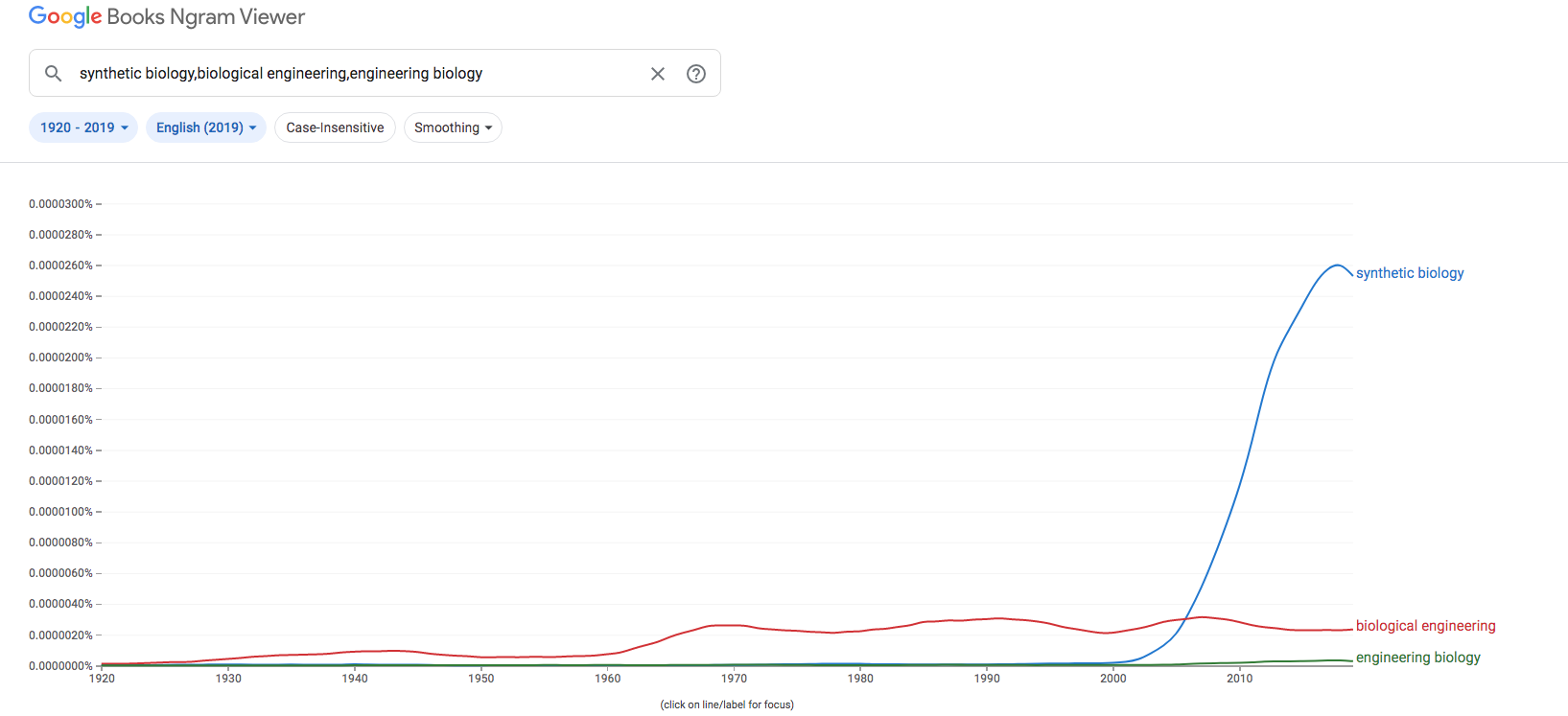
October 16, 2020, by Brigitte Nerlich
Synthetic biology, engineering biology and responsible innovation
Between about 2014 and 2018 I have been involved in the social and communications side of ‘synthetic biology’. I was especially interested in synthetic biology with relation to ‘responsible innovation’ or ‘responsible research and innovation’ or RRI (here are some blog posts).
Since then other issues have pre-occupied my mind and I lost a bit track of synthetic biology and I have moved from RRI to ‘responsible language use‘ or ‘responsible communication’. So I was a bit surprised when I recently saw an announcement about RRI and synthetic biology in which synthetic biology was called ‘engineering biology’.
What was going on, I thought? So I asked on Twitter whether other people had noticed a shift in language use from synthetic biology to engineering biology. It turns out that some had noticed it too, even well before me. The next question I asked was: Why was this shift happening? I got quite a few different answers to which I shall come back later. The question I think asked myself was: What implications does this have for RRI and responsible language use?
Numbers
But first let’s do a bit of tracking to see whether there is a shift in the use of these terms. When I put ‘engineering biology’ into Google, I was also directed to ‘biological engineering’. So I included this in my searches.
First I looked at Google NGram viewer, which is an online search engine that charts the frequencies of any set of search strings using a yearly count of n-grams found in sources printed between 1500 and 2019 in Google’s text corpora in all sorts of language.
As you can see, synthetic biology is by far the most frequently used term and the most prominent one in recent years (accelerating after around 2005), followed by biological engineering and then engineering biology. So, why choose ‘engineering biology’ over ‘synthetic biology’?
I then looked at Scopus, the largest abstract and citation database of peer-reviewed literature. As you can see, synthetic biology comes up trumps again (blue), followed by biological engineering (grey) and engineering biology (red) trailing far behind.
It seems then that the apparent shift from ‘synthetic biology’ to ‘biological engineering’ is a top down not a bottom up phenomenon.
History
Using Scopus, you can look at the first published article using a specified search term.
The first article using the phrase ‘engineering biology’ appeared in 1975 in a journal on landscape planning and said: “This paper deals with individual parts of the plan, such as nature conservation, nature reserves, preservation of historical monuments, selected sites, problems of engineering biology and the creation of new landscapes in former mining areas.” The articles after that were from a very wide variety of fields and still are.
The first paper, by Hudson Hoagland, on ‘biological engineering’ appeared in 1944 and has the enticing title “Adventures in biological engineering”. It is linked to experimental biology and, at first glance, cybernetics. Have a look here.
Most intriguingly, the first article (letter) mentioning ‘synthetic biology’ appeared in 1913 in the Journal Nature written by D.A.W. and entitled “Synthetic biology and the mechanism of life”. It is a brief summary of Stéphane Leduc’s 1912 book La biologie synthétique, étude de biophysique. Despite my best efforts and those of several scientists on Twitter, we haven’t been able to find out who D.A.W. is. Cato Hastings pointed out: “It isn’t clear who W.A.D. is. As @ruth_dixon says, there are other articles by W.A.D. from a similar time. As far as I can tell, they are all book reviews or summaries of articles by other authors. Which to me suggests, that W.A.D. was someone working at Nature, in a minor role“. So that’s the end of that exciting footnote to the history of synthetic biology, unless Nature itself tells us something on Twitter.
Synthetic biology as a term has a long and illustrious history (for a summary, see a blog post I wrote some time ago; for a more scholarly account see this article by Evelyn Fox Keller). However, most people won’t know what synthetic biology is and neither will they know what engineering biology is. So what definitions do they find when doing a bit of googling?
Meaning
Here are some definitions that come up:
“Synthetic biology is a field of science that involves redesigning organisms for useful purposes by engineering them to have new abilities. Synthetic biology researchers and companies around the world are harnessing the power of nature to solve problems in medicine, manufacturing and agriculture.”
“Biological Engineering is an interdisciplinary area focusing on the application of engineering principles to analyze biological systems and to solve problems in the interfacing of such systems — plant, animal or microbial–with human-designed machines, structures, processes and instrumentation.”
“Engineering biology is the set of methods for designing, building, and testing engineered biological systems which have been used to manipulate information, construct materials, process chemicals, produce energy, provide food, and help maintain or enhance human health and environment.”
So, it seems that synthetic biology is a field of science dealing with (engineering) ‘organisms’, while engineering biology and biological engineering are methods focusing on applications and dealing with (the engineering of) (biological) ‘systems’.
This seems to be confirmed by the description of ‘engineering biology’ in a new journal of that title founded in 2017:
“Synthetic biology is a young and interdisciplinary field of research in the life sciences. It is already revolutionising a number of fields using tools and concepts from physics, engineering and computer science to build new biological systems Engineering Biology is particularly focused on the application of engineering science and practice to the design of biological devices and systems for a wide range of fields and applications. A key aspect is systematic design using the engineering principles of modularity, standardisation and characterisation.”
Questions
Against this background we can now ask again, why has the term ‘engineering biology’ been increasingly chosen by some instead of ‘synthetic biology’? Is it because synthetic biology as a science has matured and applications are now emerging (this just published article provides a good overview of the last decade)? Or is engineering biology chosen in order to rejuvenate (the fortunes and funding of) synthetic biology, to make it pay even more, so to speak?
There are some indications for why the latter may be the case. Read for example the introduction of this policy report entitled ‘Engineering biology: A priority for growth’ by the Royal Academy of Engineering on Engineering Biology, published in 2019:
“Supporting the development of emerging technology areas with the potential to deliver economic and social benefit to the UK is a priority of the Royal Academy of Engineering. […] Other countries are ramping up support for their own engineering biology sectors, and it is critical that the UK acts now in order to take our companies to the next level of commercial success, stimulate further private investment and secure the exponential growth engineering biology can deliver.”
For more information on the promises made about engineering biology, you can also read a report and watch a video produced by the UK Bioindustry Association.
Answers
When I asked about the shift from synthetic biology to engineering biology on Twitter, some people kindly replied. One group of tweeters speculated about the possible negative connotations of the phrase ‘synthetic biology’, while another made observations about what one may call the industrialisation of synthetic biology
Phil Morle said: “Glad to see this conversation. It was common at @SynBioBeta this year. In some product categories it will be more important such as food. No one wants to eat something ‘synthetic’ or involved an ‘organism’.” Claudia Vickers tweeted “Industry is concerned about the phrase ‘synthetic biology’ and whether or not it plays well with consumers”. Walid El-Sharoud wrote: “I’d not think it is going to work well with the public who are mostly sensitive to the word ‘Synthetic’ as compared to ‘Natural’. ‘Advanced Biotechnology’ (AdBiO) (pronounced Add Bio) might work better!!”
Focusing more on the shift, Dominic Berry tweeted: “This began a while ago. Could be indicative of a range of things. Partially a response to the same terminological shift occurring in the US, partially an expectation that UK gov investment would now begin producing industrial gains, no doubt many other things too.” Along similar lines, Nicki Vermeulen pointed out: “less integration/synthesis more engineering and tech. In line with industrial strategy. The Manchester Interdisciplinary Biology building became the Manchester Industrial Biotechnology building. Same acronym different emphasis.”
Implications
When I started to work with colleagues in synthetic biology I was tasked to ‘implement’ RRI (as all synthetic biology centres created around 2014 had to do), something I never managed, I have to confess. What if I was asked now to ‘implement RRI’ for ‘engineering biology’? How would that work? The questions I would ask myself would be:
What are the implications for RRI of the increasing focus on growth, delivery and economic benefits? (We began to study some of this in the context of synthetic biology, see this EMBO report by Carmen McLeod, Stevienna de Saille and myself)
How does this relate to issue of diversity and gender, as examined here by Pablo Schyfter?
How can one focus on engineering when one isn’t quite sure what type of engineering one is talking about, as Massimiliano Simons has explored in a recent article, summarised in this Making Science Public blog post?
And: What are the (ethical, social, political etc.) implications for all of the above of the new language emerging around ‘engineering biology’? After all, the language we speak shapes the world we live in. We need to use it responsibly. We have to ask what world we want to live in in the future.
As Erika Szymanski pointed out in a tweet, some of these questions are being discussed in the research project ‘Engineering life’ at the University of Edinburgh, but I’d still invite readers to send me answers on a postcard, please!
PS Recently published paper by Lionel Clarke my be of interest!!
Image: Unsplash



A colleague has sent me a rather pertinent observation, that needs sharing. When you read the policy report I quoted in the post, you will realise that ‘engineering biology’ is not just used as a pseudonym for ‘synthetic biology’ but actually is a broader term encompassing synbio as well as industrial biotech, AI, etc.. The following passage makes that clear: “This study’s definition of engineering biology captures the entire innovation ecosystem, including advances in research and development, specifically in synthetic biology, through industrial biotechnology channels to ultimately deliver new commercially viable solutions, including those that respond to societal demands and challenges. In this context, engineering biology has the potential to underpin and transform bioeconomies worldwide.” I had included a short allusion to this in my initial quote from the report but then deleted it. I shouldn’t have!